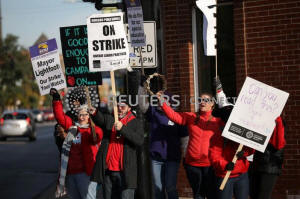Number of social workers a key sticking point in Chicago teachers strike
 Send a link to a friend
Send a link to a friend
 [October 24, 2019]
By Brendan O'Brien [October 24, 2019]
By Brendan O'Brien
CHICAGO (Reuters) - As the Chicago teachers
strike enters a sixth school day on Thursday, negotiations are hung up
in part on the question of how many social workers the third-largest
U.S. school system can afford for its 300,000 students.
Mayor Lori Lightfoot's administration has proposed doubling the current
number of school social workers from about 400 over the next five years,
while the Chicago Teachers Union wants the number tripled.
The number targeted by the union in addition to its wage requests and
proposal to employ one nurse in each of the city's schools - up from the
current one per five schools - would swell the Chicago Public Schools'
budget by about $2.4 billion a year, a 31% increase from its current
$7.7 billion level, according to the mayor's office, which calls the
proposals unaffordable.
"We need people on the ground in the schools who are ready to pick a kid
up when a problem arises, not when it explodes," said Jordan Lau, 36,
who teaches high school health and physical education, as he marched
with teachers in downtown Chicago earlier this week.

The teachers say providing additional social workers and nurses would
reduce the amount of time they need to spend handling students'
extracurricular problems.
The strike is the latest in a series of walkouts staged by U.S.
educators in recent years, following similar actions in West Virginia,
Oklahoma and Arizona. Concern over social workers also sparked a six-day
Los Angeles teachers' strike early this year. The deal that ended that
strike called for the city to hire one nurse per school and hire more
counselors.
"We wouldn't have won them without the strike," said United Teachers Los
Angeles President Alex Caputo-Pearl. "They were not budging without our
strike, so I believe the Chicago teachers are doing exactly the right
thing."
Lightfoot, a first-term Democrat whose campaign last year included
promises to improve the city's school system, is also struggling with an
$838 million funding hole in the city's upcoming budget. She unveiled a
plan on Wednesday to fill that gap by cutting spending and raising
revenues. The city's budget is separate from the budget for CPS.
[to top of second column]
|

Teachers picket near New Field Elementary School on the second day
day of a teachers' strike in Chicago, Illinois, U.S., October 18,
2019. REUTERS/John Gress/File Photo

Lightfoot said that even if the funds were available to hire the
hundreds of social workers to meet the one-per-250-students
recommendation of the National Association of Social Workers,
Chicago would have a hard time finding enough trained people to fill
the jobs.
Currently, there is one social worker for every 2,160 students
across the United States and just 40% of schools have a part-time
school nurse, while 25% have no nurse at all, according to national
organizations that track staffing levels.
'NOT A LIGHT LIFT'
"The mayor is not being dishonest when she says it won't be easy to
hire that many social workers," said CPS social worker and union
member Mary Difino. "It's not a light lift, but it's not an
impossible lift."
CPS social workers are assigned to students in multiple schools who
have individualized education plans to address their educational and
emotional needs.
Since there are not enough social workers in the system and the ones
working in CPS must meet quotas each month, they must make tough
choices when faced with students dealing with traumatic, violent
experiences or the effects of living in poverty, union members said.
Chicago Teachers Union President Jesse Sharkey told Reuters the
union felt "strong pressure" to settle the second-longest teachers
strike in recent U.S. history since some students have already gone
a week without the care they usually get from nurses and social
workers.
"But what we are fighting for is going to be worth it if we can get
it," he said.
(Reporting by Brendan O'Brien; Editing by Scott Malone and Peter
Cooney)
[© 2019 Thomson Reuters. All rights
reserved.]
Copyright 2019 Reuters. All rights reserved. This material may not be published,
broadcast, rewritten or redistributed.
Thompson Reuters is solely responsible for this content.

|